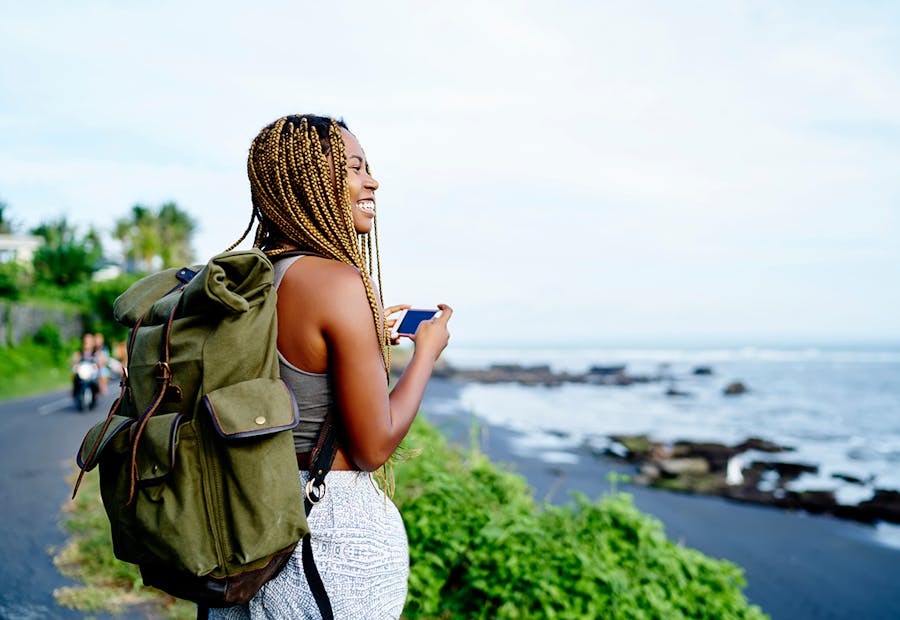
How not to look like a tourist when travelling in Africa

First impressions matter!
Let’s talk about some useful courses of action to prevent unfriendly locals from taking advantage of you. First of all, you need to play it cool and keep it simple. Although this rule may apply to almost any situation in our everyday life, it also has some extra importance for any traveller who visits Africa. A poorly informed tourist who has insufficient knowledge about the visited country would be an easy target for the preying criminals, dishonest street vendors, scammers, or corrupt officials.
Expectedly asking many questions about the basic information of the area would surely be a bad idea. Instead, you may want to share your knowledge in small talks and seek validation. Another useful trick is carefully adding using local languages in your conversations. Africa is a culturally enriched continent, and English is an official language in almost all countries(save French and German-speaking). However, using keywords or phrases of the local language will improve your standing in many situations, implying that you are no stranger to the area. In addition, African people are quite friendly and welcoming, despite the contrary belief that movies taught us. To use it for your benefit, you can have trivial conversations with the locals. It will improve your first impression in their eyes, alongside their impression of you as a tourist could be broken or at least they would know that it’s not your first time there.
It never hurts to be prepared.
Another upside that knowing the area where you will be visiting and preparing beforehand will significantly help you to stick to your budget. Electricity and clean water may be an easily accessible utility for us, for Africans as well. But in some remote areas, electricity won’t be accessible to you. Over 600 million people yearly manage to do without electricity, so can you! Charging your electronic devices to the full battery when you have the chance would be a smart move for you.
Also, you can bring extra batteries and power banks, even small flashlights and chargers that use kinetic energy instead of electricity. What’s more, you should always keep in mind that Africa is a continent where religions (local and well known alike) are widely practised. So it’s not a bad idea to dress carefully for the region that your journey has brought you. Respecting local people’s beliefs and dressing accordingly to their religion inflicts the feeling of intimacy and acceptance. Intimate relations with locals would be invaluable. Locals might invite you to unique experiences that otherwise, they might not.
Take no chance when it comes to your health!
Finally, your health is your most valuable asset in this life. And it is very important to stay healthy during your visit to Africa. There are some local disease outbreaks, as well as some worldwide outbreaks such as AIDS. Many African governments are aware of this situation and responding with firm measures.
For example, many African countries require their visitors to prove that they are vaccinated against Yellow Fever. In accordance with the current Covid-19 pandemic, other measures and restrictions may be in effect. Complying with the authorities in pandemic measures would save you both health issues and possible unpleasant quarrels. Also, you should bring sufficient amounts of iodine tablets to cope with the draughts and temporary clean water shortages/cuts. Medication could be hard to come by or heavily priced in Africa, so it never hurts to be prepared. Packing painkillers, antibiotics, insect repellants will also prove itself useful.
Handle your money with care.
There are plenty of beauties, natural wonders, welcoming people in Africa. Still, unfortunately, there are also corruption, crime, wilds of nature, and many other dangerous hazards of Africa that may give you a hard time if you face them unprepared. First of all, the world revolves around money. So you need to be extra careful and keep an eye on your purse all the time. It’s a bad idea to put all of your money in one place instead of withdrawing the necessary amount; in the event of a theft, pickpocketing, or smuggling, you would lose all of your money. Not to mention that waving around a big wallet would brand you as an unsuspecting tourist makes you an easy target for the dishonest folks. Another possible issue that’ll threaten your purse is locals scammers and corrupt officials.
Unfortunately, it’s not uncommon for corrupt officials to demand unlawful “fees” at the borders. Knowing your visa requirements and peacefully explaining them to officials may save you from the trouble, but you should avoid a raging debate; sometimes, folks don’t worth the hassle, and you don’t want to be held for several hours. The problems won’t end there, as street vendors at the border would offer you ridiculous rates for exchange. It would be best if you avoided them unless your need is dire.
Transportation could be tricky...
There will be a variable means of transportation and a lot of ways for you to be overcharged. Don’t jump into vehicles directly. Always negotiate your fare with the taxi and minibus drivers beforehand; they may ask for ridiculous amounts of money in exchange for their service. Since you already received the service, you would lose your chance to bargain. There is no such thing as an extra bag storage fee, your bus ticket includes baggage payment, so any payment request regarding your baggage is unlawful. Don’t pay them their scam money and politely explain that you are familiar with this kind of behaviour. This course of action shows your confidence and awareness, suppressing suspicions of you being a tourist.
In conclusion, Africa is a colourful continent that hosts beauties and bad things alike. You should always approach everything and everyone you encounter with respect, dignity, and love. Safe travels!


